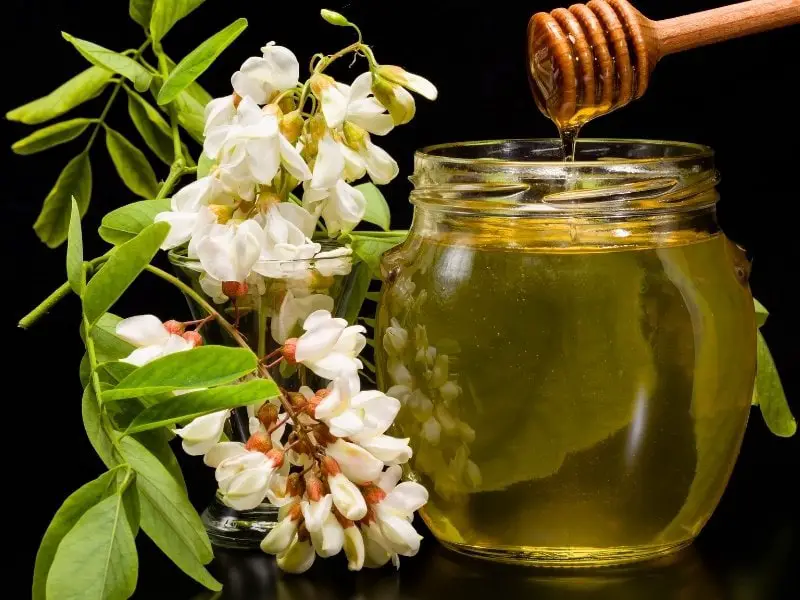Amidst the myriad honey varieties, acacia honey stands out as a rare gem, celebrated for its exquisite taste and purported health benefits. Often tucked away on specialty shelves rather than mainstream supermarkets, acacia honey has garnered attention for its unique properties and potential medicinal uses. This article delves into the captivating world of acacia honey, exploring its distinct characteristics and unraveling the purported health advantages it is believed to offer. Join us as we uncover the wonders of acacia honey and separate fact from fiction in the realm of natural remedies.
Acacia honey, not to be confused with acai honey, which doesn’t exist, is a unique and rare type of honey that might not be easy to find on the shelves of your local supermarket. Acacia honey is said to possess powerful health benefits, such as treating cancer and lowering the risk of neurodegenerative diseases.
Does it actually do that? In this article, we will be taking a closer.
What Is Acacia Honey

Acacia honey is produced by bees who pollinate the flowers of the black locust trees, which can be found in North America, Europe, Southern Africa, and Asia.
It is known for its sweet and delicate taste and floral aroma. The honey is often colorless or with a light yellow tint.
Acacia honey crystallizes much slower than traditional honey sold in most shops, and that’s probably due to its high fructose content.
Did You Know? The tree was named ‘black locust’ at Jamestown by British colonists in 1607. That’s due to its resemblance to the carob tree which is known as the ‘Old World Locust.’
Why Is It Popular?

The reason why acacia honey is sought-after is that the nectar flow of the blossoms on the black locust trees depends on the weather conditions. This means that a tree may have honey one year, while the next time can be in five years.
In addition to that, the blooming period lasts only around ten days, which is not very long in terms of honey production.
It is also one of the least allergenic types of honey due to its low pollen content, which can make it an excellent choice for those suffering from pollen allergies!
Did You Know? Acacia and black locust are often confused for each other due to their names. This is why black locust is often referred to as ‘false acacia.’
Check out our blog The Powerful Health Benefits Of 6 Kinds Of Garlic. Elevate your health with the incredible advantages of garlic.
Acacia Honey Benefits

Acacia honey, derived from the nectar of the delicate Acacia tree blossoms, is prized for its light, transparent appearance, mild, floral taste, and potential health benefits. Rich in antioxidants, this golden elixir may contribute to combating oxidative stress in the body, supporting overall well-being.
Acacia honey is also known for its potential antimicrobial properties, aiding in wound healing and promoting a healthy immune system. Moreover, its low sucrose content makes it a favourable option for those monitoring their sugar intake. While scientific research on acacia honey’s specific health effects is ongoing, its reputation as a holistic and delightful addition to the culinary and wellness realms persists.
Natural Sweetener
We get it. Some things are just not the same without sugar, no matter how hard you try to convince yourself to believe it is. The problem is, consuming refined sugar has been proven time and again to be harmful to our health.
So the real question is, what can we use to replace it? Honey, of course!
Well, and acacia honey is far from a lame option from a nutritional point of view, so keep reading to find out what it offers.
Vitamins And Minerals


First of all, Acacia honey is nutritionally powerful and is not just a simple sugar replacement. According to studies, it contains vitamins A, C, and E, and minerals such as magnesium, potassium, and iron.
- Vitamin A supports your eye health, immune function, and cell growth.
- Vitamin C boosts your immune system and prevents diseases by increasing the antioxidant levels.
- Vitamin E helps prevent inflammation and protect your cells from damage and regenerate them.
- Magnesium helps convert food into energy, create new proteins, repair DNA, and regulate neurotransmitters.
- Potassium helps regulate fluid balance, muscle contractions, and nerve signals.
- Iron is used to make hemoglobin, a protein in red blood cells that carries oxygen to all parts of the body.
Antioxidant

What if I said that acacia honey could help your immune system fight off those nasty infections and bacteria that constantly try to attack our bodies? You probably wouldn’t believe me, but science says otherwise!
Research suggests that acacia honey possesses potent antioxidants and great potential for the immune system.
It blocks the growth of inflammatory cytokines and increases the number of white blood cells, which help your body fight off infection while reducing cytotoxicity effects.
And if that’s not enough, acacia honey can also help protect the immune system and the cells from damage caused by oxidative stress.
In fact, research shows that acacia honey can increase catalase enzyme activities by getting rid of tiny extra-nuclear bodies that contain damaged chromosome fragments.
This proves that acacia honey combats oxidative stress and clastogenic activity through its antioxidant systems.
Cancer Treatment


We all probably know that we need to look after our health and wellbeing through activity, diet, and healthy habits to try to prevent serious diseases, such as cancer.
That said, we believe it won’t do any harm to look into incorporating some potent natural ingredients that can give an extra boost. And acacia honey may be considered to be a potential candidate for both cancer prevention and treatment.
Studies report that acacia honey may help stop the growth of melanoma cells, increase the release of calcium ions, reduce inflammatory cytokines, and downregulate harmful antigens.
Neurological Benefits

Last, but not least, of the benefits of acacia honey is its promising potential in lowering the risk of neurodegenerative diseases like Alzheimer’s disease.
Research shows that honey polyphenols have been found useful in improving memory and weakening neuroinflammation.
Acacia honey, in particular, has shown the ability to decrease the activity of certain enzymes in the brain that are involved in the development of the disease.
This is considered to be a viable therapeutic strategy in the prevention of the disease.
Read our blog 7 Proven Sake Health Benefits, Nutrition & Side Effects. From antioxidants to relaxation, explore the incredible ways this Japanese elixir enhances your health naturally.
Conclusion
Acacia honey benefits not only the taste buds, but it also benefits our health by providing vitamins, minerals, antioxidants, and preventing illnesses.
Do you have Acacia honey in your kitchen cupboard? Are you going to get some? Let us know what you think of its properties in the comments below!
And if you’re looking for another special honey, check out our article about fireweed honey. Explore the wonders of Acacia honey and elevate your culinary and wellness experience today.
Frequently Asked Questions (FAQs)
Is acacia honey suitable for individuals with diabetes?
With its low glycemic index, Acacia honey is considered a better option for individuals with diabetes than other sweeteners. Its slow absorption helps prevent rapid spikes in blood sugar levels. However, moderation is vital, and individuals with diabetes should consult their healthcare provider before incorporating any sweetener into their diet to ensure it aligns with their specific health needs.
Can acacia honey be used for topical applications on the skin?
Yes, acacia honey can be used for topical applications on the skin. Its natural antibacterial and anti-inflammatory properties make it suitable for wound healing, soothing irritated skin, and promoting overall skin health. However, it’s essential to ensure the honey is pure and free from additives before using it on the skin. If you have any skin concerns, consult a dermatologist before incorporating them into your skincare routine.
Are there any specific recipes that highlight the unique flavour of acacia honey?
Certainly! Acacia honey’s delicate and mild flavour makes it a perfect sweetener for various recipes. Try it in a refreshing fruit salad drizzle, light salad dressings, or as a topping for desserts like yogurt and ice cream. Its subtle floral notes enhance the taste without overpowering, providing a unique touch to sweet and savoury dishes. Experiment and enjoy the versatility of acacia honey in your culinary creations.
Is acacia honey environmentally friendly?
Yes, acacia honey is considered environmentally friendly. Acacia trees, from which bees gather nectar to produce this honey, are known for their sustainable growth and minimal environmental impact. These trees thrive in arid regions where other crops might struggle, contributing to biodiversity. Additionally, responsible beekeeping practices ensure the conservation of bee populations, further supporting the ecosystem. Choosing acacia honey aligns with environmentally conscious and sustainable choices.
Where can I get high-quality acacia honey?
You can find high-quality acacia honey at specialty food stores, local farmers’ markets, or reputable online retailers. Look for trusted honey producers or brands that prioritize purity and authenticity. Reading customer reviews and checking for certifications, such as organic or raw labels, can help ensure the honey’s quality. Purchasing directly from beekeepers or local apiaries may offer a fresher and more authentic acacia honey experience.
